 Multiple Choice Questions
Multiple Choice QuestionsThe P50 value of haemoglobin for oxygen is increased during exercise. The mechanism of this change is described in the following proposed statements.
A. Increased CO2 production by muscles elevated CO2 of blood which affects P50 value.
B. The affinity of hemoglobin for oxygen increases as 2,3-bisphosphoglycerate (2,3-BPG) level is elevated.
C. Increased body temperature shifts the oxyhaemoglobin dissociation curve to the left.
D. The decreased pH of blood reduces the affinity hemoglobin for oxygen.
Which of the above statement(s) is (are) incorrect?
Only A
B and C
Only C
A and D
An action potential of a nerve fibre is described by different components including after-hyperpolarization. The mechanism of generation of this after-hyperpolarization has been proposed in the following statements:
A. The increased conductance of Na+ has returned to the base line level but the conductance of K+ remains elevated during after-hyperpolarization phase.
B. The membrane potential is pulled even closer to the K+ equilibrium potential at the after-hyperpolarization phase.
C. The conductance of Na+ is increased before any change of K+ conductance during after-hyperpolarization phase.
D. At the after-polarization phase, the membrane potential is driven closer to Na+ equilibrium potential.
Choose the option with both correct statements:
A and B
B and C
C and D
A and D
Given below are spatial and temporal techniques (column I) used to detect brain activity (column II).
| Column I | Column II |
| A. Functional magnetic resonance imaging | i. Uses short-lived radioactive material to map functional processes in brain |
| B. Positron emission tomography | ii. Measure the fluctuation of dipole voltage in neurons of brain. |
| C. Computed tomography | iii. Detects changes in blood oxygenation and flow due to neural activity. |
| D. Electroencephalogram | iv. Images of brain obtained by differential absorption of X-rays. |
Select the correct set of combination.
A - i; B - ii; C - iii; D - iv
A - iii; B - i; C - iv; D - ii
A - iv; B - iii; C - ii; D - i
A - ii; B - iv; C - i; D - iii
When the electrical response of the two receptors A1 and A2 in a noctuid moth that was exposed to a variety of sounds was measured, it produced the following patterns:
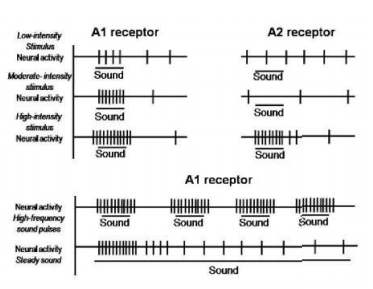
Given this, which one of the following statements is INCORRECT:
The A1 receptor is sensitive to sound of low to high intensity.
A2 receptor begins to produce action potential only when a sound is loud.
Both the receptors have similar response to high intensity sound.
The A1 receptor fires much more frequently to steady, uninterrupted sounds than to high-frequency pulses of sound.
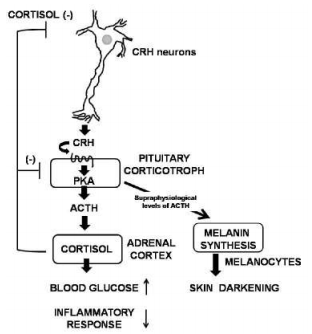
The above figure depicts the regulation of hypothalamo-pituitary (HPA) axis. Changes in cortisol level in Addison's disease can lead to
suppressed immune system and increased blood glucose level
gain of body weight and lightening of skin
loss of body weight, reduced blood glucose level, and hyperpigmentation.
increased blood glucose and activated immune system
Relative rates of red blood cells production in the bone marrow of different bones of different ages are shown below:
Identify the correct figure.

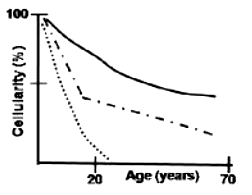
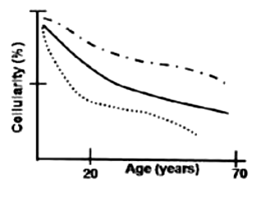
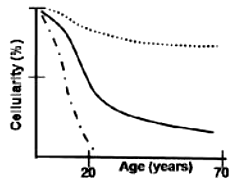
![]()
When a skeletal muscle was passively stretched, it contracted reflexly. However, when the muscle was overstretched in this way it showed sudden cessation of contraction followed by relaxation. The following statements provided the possible explanation of these observations:
A. The passive stretching of muscle caused stretching of the muscle spindle.
B. The over-stretching of muscle stimulated the Golgi tendon organ.
C. Group 1b sensory nerve fibers were stimulated by stretching of the muscle spindle.
D. Group 1b sensory nerve fibers stimulated α-motor neurons that supplied the muscle from which these fibers arose.
E. Group 1a sensory nerve fibers were connected to the Golgi tendon organ.
F. The stimulation of group 1a sensory fibers led to the production of IPSP on the α-motor neurons that supplied the muscle from which these fibers arose.
Which of the above statement(s) is/ are correct?
A and B
C and D
E and F
C and F
In the glomerular capillary (GC), fluid moves into Bowman's capsule through its almost entire length. But in the muscle capillary (MC), fluid moves into interstitial space at its arteriolar end. The difference between these two capillaries is explained in the following proposed statements:
A. Afferent and efferent arterioles are present on the two ends of GC, but in MC, arteriole and venule are present on two ends.
B. The hydrostatic pressure in GC is higher than that in MC.
C. The efferent arteriole in GC has a relatively low resistance, but venules in MC has a high resistance.
D. The difference of hydrostatic pressure between two ends of GC is relatively more but it is negligible in MC.
E. The difference of oncotic pressure between two ends of MC is negligible but it is relatively more in GC.
F. The net filtration pressure falls to zero at the efferent end of GC but it is 9 mm Hg inward at the venular end of MC.
Which of the above statements are INCORRECT?
A and B
C and D
E and F
B and D
The pacemaker cells of sinoatrial node (SA node) are inhibited by the stimulation of vagus nerve. The probable inhibition are stated as follows:
A. The acetylcholine- regulated K+ channels are activated.
B. The outward K+ causes hyperpolarization of pacemaker cells.
C. The inward "funny current" of pacemaker potential is increased.
D. The increased intracellular cAMP, induced by activation of M2 muscarinic receptors, slows the opening of Ca++ channels.
Choose the answer with correct statements.
A and C
B and C
A and B
C and D
The following statements describe the possible functions of the outer hair cells (OHC) of organ of Corti:
A. The outer hair cells (OHC) are depolarized or hyperpolarized depending on the direction of the movement of stereocilia.
B. The OHC are lengthened in depolarization and shortened in hyperpolarization.
C. The OHC decrease the amplitude and clarity of sound by shortening and lengthening.
D. The efferent nerve fibers of the olivocochlear bundle modulate the sensitivity of the OHC.
E. The effect of stimulation of the olivocochlear bundle on the OHC is excitatory.
Which one of the options given below represents the correct statements?
A and B
C and D
A and D
D and E
